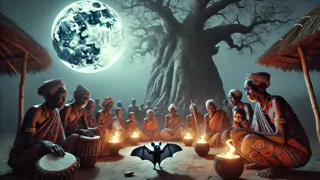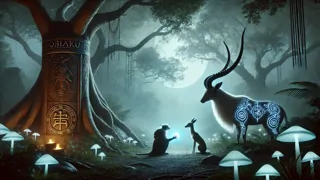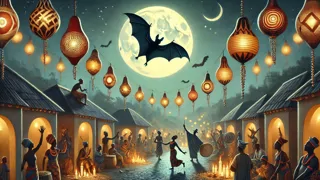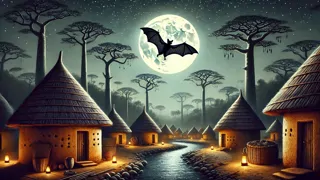Introduction
In the shadowed heart of the Nigerian rainforest, where towering iroko trees whispered prayers to the moon, lived a young bat named Obiaku. Each night he drifted above woven huts of sunbaked clay, tracing patterns in the star-speckled sky as lanterns flickered like fireflies below. The air brimmed with the perfume of frangipani and the distant murmur of festival drums, calling souls to gather beneath ancient baobabs for tales of ancestors. Though his wings were as sleek as polished ebony, Obiaku longed for more than midnight’s embrace—he dreamed of touching dawn’s first glow, where eagles carved arcs against the rosy horizon and dew-kissed petals awaited the sun’s caress. One evening, as the harvest moon swelled full and ripe, the Great Moon Spirit descended in a flood of silver light. With a voice soft as falling dew, it offered Obiaku a single gift: to rise with the sun’s earliest rays, to witness colors unseen by nocturnal eyes. But this boon came with a solemn condition: a promise to honor the balance of day and night without fail. With cheeks warmed by excitement, Obiaku pledged his vow upon the night breeze, unaware that a single faltering word could unravel the sacred harmony binding the sky. Thus began the tale of how a bat’s broken promise cast shadows into the dawn and taught an entire village the weight of integrity beneath the cosmic canopy.
A Promise under the Full Moon
Under the glow of the harvest moon, the village stood hushed. Obiaku emerged from the dense canopy, wings shimmering like onyx ribbons against the panoply of stars. The elders had gathered beneath the ancient baobab, its gnarled limbs stretching toward the night sky, as though seeking communion with the heavens. Torches flickered along the earthen walls, casting dancing shadows on weathered faces lined by time and wisdom. Children peered from behind their mothers’ brightly woven wrappers, eyes wide with anticipation of the sacred ceremony. The air was thick with incense from burning kola nut husks, and the rhythmic thrum of drumbeats pulsed through every clay hut. As Obiaku hovered before the assembly, the Great Moon Spirit descended in a halo of silver light, its presence both gentle and commanding. Soft voices of ancestors seemed to stir in the wind, whispering of promises made in ages past. With each beat of his chest, Obiaku felt the weight of destiny settle on his narrow shoulders. He bowed his head, marveling at the spirit’s luminous form, and steeled his heart for the vow he was about to take.

At dawn’s blush, the village awoke in vibrant expectation. Smoke tendrils curled from pottery bowls, and the sweet fragrance of roasted plantains drifted on the gentle breeze. Woodland creatures stirred along the riverbank: red colobus monkeys chattered softly, and a pair of antelopes stepped lightly through the underbrush. Yet all eyes turned skyward, searching for the silhouette of Obiaku emerging with the sun. Hopes soared as the horizon bled into shades of rose and gold, but minutes slipped into hours, and there was no sign of the young bat. Questions murmured through the crowd—some voiced in concern, others cloaked in worry. Had Obiaku misunderstood the weight of his promise? Had the lure of night’s mystery kept him from fulfilling his vow? The elders exchanged solemn glances beneath furrowed brows. Among them, Mama Ayo, keeper of ancestral tales, whispered quietly to her granddaughter, reminding her that every choice carries consequence. Meanwhile, Obiaku lay nestled in a hidden crevice deep within the forest, cradled by vines heavy with dew. His wings, heavy with slumber and guilt, trembled as he recalled the spirit’s radiant visage and the hope that had once burned bright within him. Outside, the villagers waited in silent vigil—an unspoken plea woven into the morning air, urging him to remember the oath sworn beneath the full moon.
As the sun reached its zenith, painting the sky in brilliant azure, Obiaku lifted himself into the air. His heart pounded like a drum unbridled, each beat a reminder of his pledge. Far below, the elders and villagers held their breaths, watching with solemn eyes. The Great Moon Spirit materialized once more, its glow cool and unyielding beneath the blazing sun. A hush fell over the land as it spoke in tones that resonated like distant thunder: 'Obiaku, you have broken your sacred vow. Your wings may never dance with daylight again. You shall find freedom only under the cover of night, where your heart belongs.' With a final radiance, the spirit withdrew, leaving the young bat trembling in the glare of the sun’s harsh light. A collective gasp rippled through the crowd as wise Mama Ayo murmured an ancient proverb: 'Those who shatter trust under the moon must learn to embrace the night.' From that day forward, Obiaku’s wings no longer felt the warmth of dawn. He soared skyward only after twilight beckoned, his silhouette tracing arcane patterns against the moonlit sky. Yet in his heart, he carried a lesson more precious than sunlight—a wisdom forged in regret, guiding him through the hours when shadows held court. The villagers, too, remembered the cost of broken words, teaching every child that promises made in moonlight must never be forgotten. And so, in that forest by the Niger River, the song of bats at dusk became a humble reminder of honor, echoing across generations under the watchful eye of the moon.
The Broken Oath
After the moon’s judgment fell upon Obiaku, the villagers returned to their lives forever altered. At dusk, clusters of lantern light swung like tiny lanterns along winding dirt paths, but these lights no longer signified only festivity—they also flickered with cautious respect for the creature banished from morning’s splendor. In the heart of the settlement, Mama Ayo convened an evening gathering beneath the lantern-lit baobab canopy. She spoke of vows and the invisible threads that bind promises to honor, her voice resonating like the steady hum of cicadas in the dark. Among the listeners, even those who had once seen only a mischievous bat now understood the depth of trust. The potter, whose clay bowls Obiaku had rarely disturbed, wove a delicate cradle from willow twigs and sage, leaving it at the forest edge as a token of goodwill, hoping to coax the bat closer. And the fishermen along the riverbank, whose nets glistened with silver tilapia, whispered prayers on the water’s surface, calling for the bat’s safe passage through shadowed branches. As word of these gestures reached Obiaku’s hollow, he felt a tremor of gratitude overcome his remorse. No longer did he wander with the reckless abandon of youth; instead, he listened for the subtle crack of a twig or the faint sigh of wind through leaves, knowing these sounds carried the heartbeat of his community.

Driven by the villagers’ kindness and the gentle urgings of the river’s murmur, Obiaku embarked on a pilgrimage through the forest depths to retrieve the luminescent pearl left by Mawu. His wings cut through the humid air thick with the scent of moss and frankincense-laced smoke from distant rituals. He paused by a waterfall where doves gathered to drink under the moon’s silver veil, their coos echoing like soft prayers. At the river’s edge, he discovered the cradle, now empty but for a single footprint pressed into the soft earth. A path of luminescent fungi glowed faintly, guiding him deeper into a grove of ancient ebony and mahogany trees, each trunk carved with symbols of ancestors long passed. As Obiaku followed the gentle glow, he felt the echo of his own heartbeat synchronize with the forest’s nocturnal choir—crickets, tree frogs, and the whisper of leaves overhead. Suddenly, Mawu emerged once more, her antlers refracting moonbeams into a spectral rainbow. In her quiet gaze, Obiaku saw both the sorrow of his failure and the possibility of atonement. The silver pearl hovered between them like a suspended promise. To reclaim it, he had to offer something of equal weight—an act of courage, humility, or compassion earned in the night’s sacred hours. Obiaku lowered his head, recalling every moment he had taken the darkness for granted. Then, with faltering wings, he lifted himself into a spiral above the grove, performing a dance of repentance—twined loops and gentle dives that traced the shape of his shame and hope. At the dance’s end, he alighted before Mawu, breathing softly. The antelope nodded, and the pearl floated into Obiaku’s outstretched claws, its light pulsing in time with his newly steadied heart.
When Obiaku returned at dusk with the sacred pearl nestled in the cradle, a chorus of relief and reverence rose from the assembled villagers. Lanterns were lit at the forest’s edge, their glow dancing on the river’s surface like scattered jewels, as elders and children alike watched his approach. Mama Ayo stepped forward, her palm outstretched to receive the pearl shimmering with the essence of moonlight and contrition. As Obiaku placed it in her hand, she whispered an ancient blessing, her voice weaving through the air like silk: 'May this pearl remind us all that humility rebuilds what pride destroys.' In that instant, the divide between bat and people vanished beneath a single understanding: that every voice, no matter how small, has the power to shape destiny. To honor this unity, the villagers held a feast of roasted yams and palm wine, their songs carrying into the night as Obiaku circled overhead. From his vantage above, he witnessed the flicker of lanterns reflected in upturned faces—each one a reminder that broken oaths, when met with compassion, could spark renewal. As dawn approached, he resisted the urge to follow the rosy horizon. Instead, he dipped in a graceful arc beneath the moon’s waning light, embracing the shadows he once scorned. And thus, the night was his to guard, the dark sky his canvas, and the promise he kept became a guiding star for all who looked upward.
Eternal Night Flight
Long after the elders laid the pearl to rest within the sacred grove, the tale of Obiaku’s broken vow and subsequent redemption became woven into the fabric of every nightfall across the Niger region. In that tapestry of legends, children gathered around flickering hearth fires to reenact the bat’s solemn dance of apology, using slender sticks to trace loops in the dusty ground. They sang songs in yam and kola rhythms, their voices rising like fireflies swirling in the darkness. From the banks of the river to the limestone cliffs overlooking the valley, storytellers recited the moral: that honor given under the moon’s gaze binds hearts together beyond the reach of shadows. Travelers carried the account to distant markets, where merchants hummed the melody of the bat’s wingbeat before trading salt and spices, and farmers left offerings of freshest palm kernels at the forest’s fringe to honor the nocturnal guardian. Scholars from neighboring kingdoms penned verses immortalizing Obiaku’s journey, praising the humble spirit that could outshine the brightest dawn. In every retelling, the simple lesson endured: strength is measured not by pride, but by the sincerity with which one mends what has been broken.

As generations passed, the villagers established an annual festival called the Night’s Promise, observed when the moon reached its fullest phase. Lanterns carved from gourds painted in patterns of bats and pearls lined the village pathways, and drums shaped like hollowed baobab trunks sent deep thwacks through the still air. Young children, wearing pouches of millet, performed intricate dances that mimicked the flutter of Obiaku’s wings, their steps echoing the swings and spirals of his repentant flight. Elders guided these performances with solemn chants, recounting how a single promise could ripple across time and forge bonds between earth and sky. The festival feast featured roasted bush yam, smoked fish from the river, and stews brewed with okra and shrimp—a celebration not just of food, but of community healed and trust restored. As candlelight shimmering against painted masks flickered, a hush would fall, and the head storyteller would step forward to recite the final words of the folktale: 'Let no promise be made lightly, for the moon sees all, and every vow shapes the balance of the cosmos.' In those moments, listeners felt the weight and wonder of their own commitments, making the festival as much a ceremony of self-reflection as of communal joy.
To this day, when dusk gives way to nightfall, families in the region look skyward, seeking the familiar silhouette of a lone bat slicing through the twilight haze. Children are taught to whisper their own sacred vows upon the breeze—vows of kindness, responsibility, and respect—believing Obiaku carries them on silent wings to the realm of spirits. Hunters set aside a small portion of their catch for the bat to remind themselves of the delicate balance between hunter and hunted. Farmers leave seeds at the forest’s edge so that the night guardian might ensure a bountiful harvest at dawn. And poets, inspired by the interplay of wingbeat and moonlight, pen verses that compare the fragility of trust to the fragile membrane of a bat’s wing. In bustling towns illuminated by electric lights, elders still dim their lamps when the moon is full, honoring the creature who once yearned for sunlight but found his true purpose under starlight. Thus, the legend of Obiaku persists—a testament to how a single broken promise can transform into a legacy of wisdom, teaching every generation that the night holds its own beauty, purpose, and guiding light.
Conclusion
In every whisper of the night wind and every shimmering reflection on the river’s surface, the story of Obiaku endures. A simple bat who once let pride eclipse his promise, Obiaku discovered that humility and honor carry a light stronger than the sun’s glare. Stripped of dawn’s warmth, he embraced the beauty of the darkness, learning to guide lost souls, protect the vulnerable, and nurture a bond between humans and creatures scripted in starlight. Across generations, his tale reminds villagers and travelers alike that every vow, spoken under moonbeams or sunshine, is a thread woven into the tapestry of life. Broken words can fracture that tapestry, but sincere repentance and compassionate action can restore its pattern, richer and more resilient than before. Today, when children gaze skyward at the flutter of a bat’s wings against the moon, they’re not just witnessing a creature of the night—they’re part of a living folktale that teaches respect, responsibility, and the transformative power of keeping one’s word. Thus, as shadows stretch and night unfurls its velvet cloak, the bat ascends once more, carrying a timeless lesson beneath the watchful eye of the moon.

















